Exhibitions
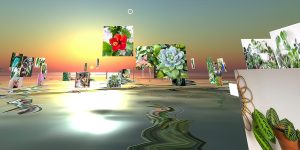
PostSensorium. Stranger Senses
Kwan Q Li (HK/US), Pohao Chi (TW/US), Weihan Jiang (CN/US), Weilu Ge (CN/US), Kelon Cen (CN/US), Ieva Viksne (LV), Gustavs Lociks (LV), Jung Eun Lee (KR/DE), Christina Vinke (DE)
“..to live means first and foremost to look, taste, feel, and smell the world around us.” (Emanuele Coccia, 2016) With more recent enhancements of immersive and sensing technologies, our 'sensoriums' have intensified and become more mediated than ever before. Art and concepts (that are our “strange tools” – coined by contemporary philosopher Alva Noë (2015)) are perfect instruments to stimulate our perception.

Audio Game Center
DDD (Disability Driven Design) Project (JP)
Audio games are created from sound and played with sound, unlike video games where visual information is essential. The project explores the possibilities of experiences created by sound using various media and venues, such as holding game centers in real places, hosting “Prototyping Party”, a hackathon to develop new games with various creators, carrying out online distribution and podcasts.
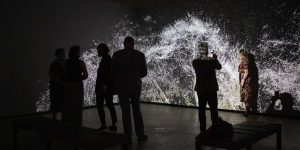
PostSensorium. Atmospheric Forest
Rasa Smite (LV), Raitis Smits (LV), and other RIXC Garden participant WebVR works.
Meandering between different realities, actual, hybrid and virtual, RIXC Garden program PostSensorium reflects upon an incessant evolution of the human and “more-than-human” sensoriums conditioned by new technological advancements. Located in a triangulation between three cities - Riga (LV), Boston (US) and Karlsruhe (DE), RIXC Garden program will feature Live Greenhouse Concert from Riga; an immersive screening program by young and emerging artists from Boston; and Virtual PostSensorium room for spatial webVR experiences and networked interactions.

Architectural Informatics Society
Architectural Informatics Society (JP)
As a platform where diverse and advanced theories, technologies and industries intersect, AIS will promote the dissemination and development of technologies and knowledge through the sharing and dissemination of information on the latest technologies, cross-industry and cross-disciplinary exchanges and human resource development, while looking at the evolution of the positioning of architecture itself as a more fundamental consciousness and broader concept, rather than the superficial application of informatics to the field of architecture.
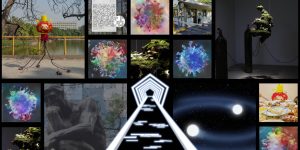
Entrance Deal
Su-Ch Hsu (TW), Chen-Hua Lu (TW), FBI Lab (TW), Chiao-Chi Chou (TW), You-Yang Hu (TW), Jiahe Zhao (CN), Xuezhi Liu (CN), Shih-Hung Ku (TW), IoA/NTHU (TW), Yuan-Fu Yang (TW) & Iuan-Kai Fang (TW)
With the rapid development of science and technology, many changes have occurred in society, politics and life. There are many different “entrances” in science, in society, in emotion, and in ecology. Some of these entrances allow us to explore the roots of life, some make our society a paradigm shift, some make subtle changes in emotions between people, and some even bring a huge change in the world.
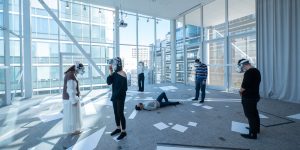
VR theater, “Prometheus Unbound” Ars Electronica 2021 Garden TOKYO ver.
Meiro Koizumi (JP)
The VR theater piece "Prometheus Bound," which premiered in 2019, created an experience that placed the audience between two extremes: virtual and real, euphoria and awakening, transcendence and limitation of the physical body. The online version of the new VR work, a sequel to the previous work, will be revised and exhibited as Ars Electronica 2021 Garden TOKYO ver.

Hybrid exhibition “Algaphon”
Harpreet Sareen (US/IN/JP), Franziska Mack (DE/US), Yasuaki Kakehi (JP), Yasuaki Kakehi Laboratory, The University of Tokyo (JP)
Algaphon is a hybrid installation where algae bubbles that ring at minnaert frequency near algal filaments are rendered audible through a hydrophone. Online visitors can leave a voice message that is translated into photosynthetically active radiation (PAR) variations in a remote aquarium.
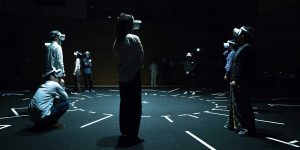
Video documentation of “Prometheus Bound”
Meiro Koizumi (JP)
Inspired by the Greek tragedy “Prometheus Bound,” this work is an experiential theater piece that uses VR/AR technology to develop the tension between technology and human society, which has been altered in various ways in civilization.

CyberArts 2021
The CyberArts exhibition will showcase award-winning media artworks from the 2021 Prix Ars Electronica and thus provide an insight into current developments and trends in the digital age.
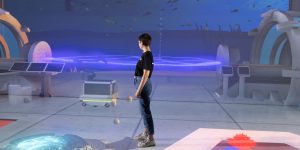
CoBot Studio
LIT Robopsychology Lab, Johannes Kepler Universität Linz (AT), Center for Human-Computer Interaction, Universität Salzburg (AT), JOANNEUM RESEARCH – ROBOTICS (AT), Polycular OG (AT), Österr. Forschungsinstitut für Artificial Intelligence OFAI (AT), Blue Danube Robotics GmbH (AT), Ars Electronica Futurelab (AT)
When humans and robots work side by side, it’s not always easy: widespread skepticism and a lack of communication paradigms will create new challenges in future work environments. How can trust and acceptance be established in the workplace of the future? How can human-robot work environments be designed?

